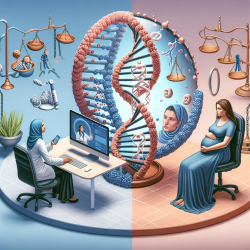In the rapidly evolving field of prenatal genetic testing, staying abreast of legal implications is crucial for practitioners, especially those offering online therapy services. The research article, "The Legal Past, Present and Future of Prenatal Genetic Testing: Professional Liability and Other Legal Challenges Affecting Patient Access to Services," by Deborah Pergament and Katie Ilijic, offers invaluable insights into this complex landscape.
Key Takeaways for Practitioners
Understanding Federal Regulations
Federal agencies like the Centers for Medicare and Medicaid Services (CMS), the Food and Drug Administration (FDA), and the Federal Trade Commission (FTC) play pivotal roles in regulating prenatal genetic tests. These regulations are designed to ensure that genetic tests are reliable and that the information provided to patients is accurate. Practitioners must be aware of these regulations to provide accurate counseling and avoid potential legal pitfalls.
Professional Liability
One of the most significant influences on the actions of healthcare providers is the fear of tort litigation. Cases of alleged malpractice in prenatal genetic testing often revolve around negligence in providing accurate information or failing to perform necessary procedures. Practitioners must ensure they adhere to professional standards and provide comprehensive, accurate information to mitigate the risk of litigation.
Importance of Informed Consent
Informed consent is a cornerstone of prenatal genetic testing. Practitioners must ensure that patients fully understand the risks, benefits, and limitations of the tests being offered. This includes discussing the potential for false positives or negatives and the implications of test results. Proper documentation of informed consent can serve as a critical defense in malpractice cases.
Implementing Research Outcomes
Enhancing Communication
Effective communication is essential in prenatal genetic counseling. Practitioners should strive to explain complex genetic information in a way that is understandable to patients. Utilizing visual aids, written materials, and follow-up consultations can enhance patient comprehension and satisfaction.
Staying Updated with Guidelines
Professional guidelines from organizations such as the American College of Obstetricians and Gynecologists (ACOG) and the National Society of Genetic Counselors (NSGC) provide a framework for best practices. Practitioners should stay updated with these guidelines to ensure they are providing care that meets current standards.
Continuous Education
The field of prenatal genetic testing is continually evolving. Practitioners should engage in ongoing education to stay informed about new developments, technologies, and legal considerations. Attending workshops, webinars, and conferences can provide valuable opportunities for professional growth.
Encouraging Further Research
While the research by Pergament and Ilijic provides a comprehensive overview of the legal landscape, there is always room for further exploration. Practitioners are encouraged to delve deeper into specific areas of interest, such as the impact of new genetic testing technologies or the evolving legal standards surrounding informed consent.
By implementing the outcomes of this research, practitioners can improve their skills and provide better care to their patients. Staying informed about the legal and ethical implications of prenatal genetic testing is essential for safeguarding both patient well-being and professional integrity.
To read the original research paper, please follow this link: The Legal Past, Present and Future of Prenatal Genetic Testing: Professional Liability and Other Legal Challenges Affecting Patient Access to Services.










